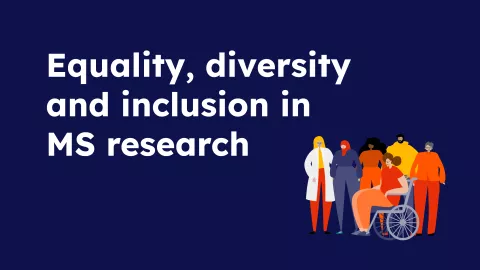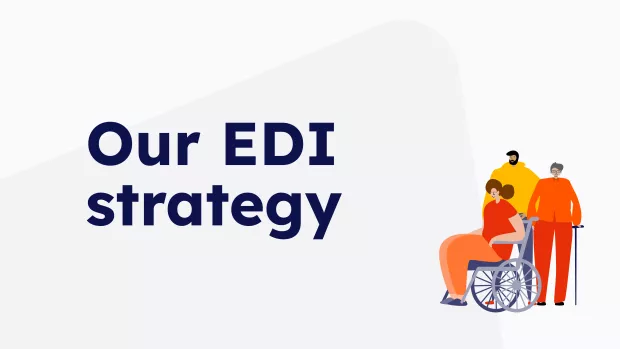
Equality, diversity and inclusion (EDI) in MS research
We believe that diversity is the key to research excellence. And we’re committed to building an inclusive research culture.
It’s essential we’re attracting diverse talent into MS research. And that we support them to thrive and drive more inclusive MS research. MS affects everyone differently. So it’s important the research we fund is relevant to everyone affected by MS. This is regardless of:
- age
- ethnicity
- gender
- beliefs
- sexual orientation
- how much money they have.
Our EDI in research action plan and progress
Our action plan to improve EDI in MS research
In September 2019, we approved a new organisational strategy for 2020-2024. This included a commitment to "put diversity and inclusion at the heart of everything we do”.
We know research has some unique challenges. We've had the help of researchers, people affected by MS and learnings from other research charities. And, together, we’ve developed an action plan to improve equality, diversity and inclusion (EDI) in MS research. Our action plan outlines the work we'll deliver between now and 2024. And this'll help us reach and support underrepresented groups in the MS research community.
Download our EDI action plan for our funded research [PDF, 327.72 KB]
Progress we've made against our action plan
We’re pleased with the progress we’ve made so far. Explore our key activities in 2023 and a snapshot of our priorities for 2024.
Read about the progress we’ve made against our action plan in 2023 (PDF 185 KB)
Our previous reports
Read our 2022 progress report (PDF, 213 KB)
Diversity and inclusion in the MS research workforce
Research has a diversity issue. But we don’t have enough data to understand what’s happening in the MS research workforce.
You can help us understand how diverse our researcher community is by completing an EDI survey. We’ll use data collected from this survey to help us better understand who carries out MS research. This'll help us shape a more diverse and inclusive research community.
What do we know about who does MS research?
Across scientific research, there are known inequalities in ethnicity, gender, age and other protected characteristics. We think there's a similar problem in the MS research community. But we don’t have enough data right now to fully understand the picture.
Why do we need to know more?
We could be missing out on future leaders in MS research. And more diverse researchers could drive new developments and innovation. We need evidence to understand how diverse the MS research community is.
We also need to understand where the imbalances are. This'll help us make relevant and targeted changes to better support researchers from underrepresented communities.
How can I help?
You can help us build this evidence by completing the EDI survey hosted on our grants management system, Grant Tracker. If you’ve previously used Grant Tracker, you’ll get an email with a link to the survey.
Log into Grant Tracker to complete the EDI survey
What will my data be used for?
We’ll analyse the anonymised EDI data every year to identify trends. We’ll report on this when we update on the progress of our research EDI action plan.
We’ll use this information to develop ways to reach and support underrepresented groups in the MS research community. Our other strategies outlined in our action plan will also help towards this.
We’ll continue to encourage Grant Tracker users to share their EDI information with us. That way we can monitor the effectiveness of our initiatives in improving inclusion and diversity.
What we know so far about diversity in our funded research and governance panels
We collected demographic data on our applicants, award holders and governance members for the first time in 2022.
The data here is from applicants to our 2022 Research Award rounds. 'Award holders' are applicants from this round that were successfully awarded research funding. Our governance committee members are researchers, clinicians, MS healthcare professionals and people affected by MS that sit on 'governance panels'. These panels, like the Research Strategy Committee, guide our research program and oversee many of our funded projects.
You can read more about this data in our 2022 Demographic Data Report
Key findings from the 2022 demographic data
Our applicants and Award holders
- 11% of applicants are from an ethnic minority background. This is lower than the proportion of staff in the medical academic sector (17%)
- There was a 38% success rate for applicants from an ethnic minority background compared to 32% for white applicants
- 49% of our Award holders in 2022 identify as female
- 9% declared a disability
Our governance committee members
- 6% of our governance members are from an ethnic minority background. This means we're below our target of 10% representation from people from ethnic minority backgrounds across our governance panels
- None are from Black or Mixed/Multiple ethnic backgrounds
- 59% of our governance members identify as female
- None are under 40 years of age. The largest proportion of our governance members are between the ages of 40-49
- 17% have declared a disability. And all 17% declared they have MS
Find out more about our EDI work across the organisation
We’ve established an organisational strategy that puts diversity and inclusion front and centre of everything we do.
Read more about our Organisational Strategy and progress we've made
We're looking for people to join our EDI Reference Group to help us deliver this strategy. Email us to find out more.




